Optimizing your LinkedIn profile is a great way to increase your visibility on the platform. LinkedIn keywords are terms that help LinkedIn’s algorithm match your profile to relevant searches, making it easier for recruiters, potential clients, or business partners to find you.
When used strategically, keywords on LinkedIn can make your profile more discoverable in search results.
LinkedIn Keywords Optimization Tips
SEO for LinkedIn is the process of adding keywords to different sections of your profile in order to help match your profile with the queries people use to perform searches on the network. In other words, you tailor your profile content to appear in relevant search results.
Using LinkedIn SEO keywords prudently throughout your profile can increase your visibility and create more engagement. The idea is to choose terms that your target audience uses to perform searches on the platform and then integrate them naturally throughout your profile.
Here are some quick tips to optimize your LinkedIn profile with keywords:
- Identify the LinkedIn keywords most relevant to your industry and skills;
- Use these terms naturally throughout your profile;
- Focus on commonly searched job titles, skills, and industry-specific terms;
- Keep your profile up to date with trending keywords;
- Avoid keyword stuffing. It’s about relevance, not repetition.
- Take inspiration from LinkedIn keywords examples, especially from the profiles of other people working in your industry or niche.
How to Add Keywords to LinkedIn Profile
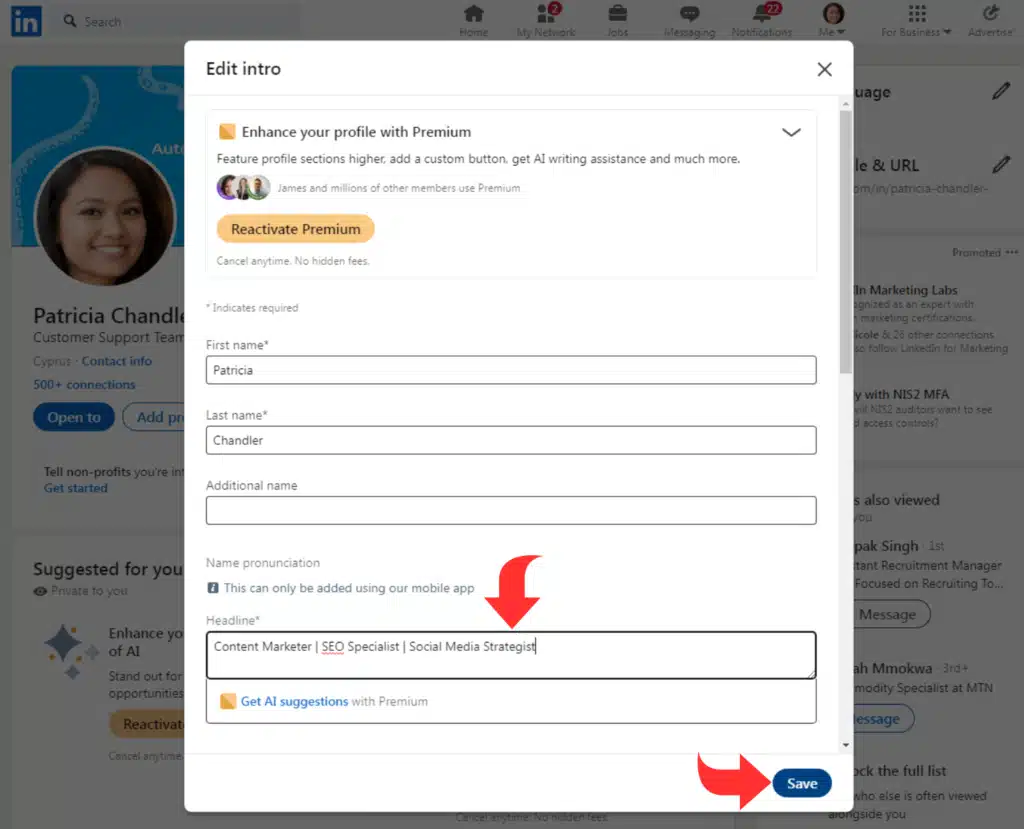
You can add keywords for LinkedIn profile to your headline, summary, experience, and skills sections. Each section provides you with a chance to highlight your strengths and align your profile with search queries.
Headline: Your headline is the first thing that appears in search results. This means your headline should include keywords that define your role, expertise, and industry focus.
Example: Instead of a generic “Digital Marketer,” use “Content Marketer | SEO Specialist | Social Media Strategist.” This headline clarifies your specialization through keywords relevant to your field.
Summary: The Professional summary or About section allows you to tell your professional story. It is a good idea to use key terms in this space, such as your skills, tools you use, and important accomplishments. In doing so, be sure to integrate your keywords naturally into the content of your summary.
Example: “As a seasoned Data Analyst with expertise in Tableau, Python, and advanced Excel, I transform raw data into actionable insights. I’ve helped organizations improve decision-making by implementing predictive analytics and business intelligence tools.”
This description mentions specific skills and tools besides showcasing achievements, increasing the chances of matching relevant searches.
Experience: In your experience section, you should also clearly state your work history and achievements and the tools and methodologies tied to your roles. You can use bullet points to emphasize keywords that identify with recruiters or potential leads.
Examples:
- Led a team of 10 to develop and execute SEO strategies, resulting in a 35% increase in organic traffic;
- Implemented CRM systems (HubSpot, Salesforce) to streamline sales processes and enhance client engagement.
Skills: The skills section is a great place to list your strengths. Choose skills relevant to your expertise and commonly searched for on LinkedIn. For instance, you could use terms like “Digital Marketing,” “Agile Methodologies,” or “Data Visualization” based on your expertise or industry needs.
Example: If you’re in software development, adding “JavaScript,” “ReactJS,” and “API Development” will increase your profile’s visibility in tech-related searches.
Education and Certifications: Many people overlook the education and certifications sections when optimizing their LinkedIn profiles. However, adding keywords in these sections can also help your profile appear more in searches.
Example: Integrating keywords like “Certified Google Ads Professional” or “AWS Certified Solutions Architect” will make your profile more visible to people looking for these qualifications.
Projects and Publications: The projects or publications section is another excellent place to optimize your profile with keywords. For instance, if you authored a report on digital transformation, go ahead and include keywords like “Digital Strategy” and “Cloud Integration” in your projects or publications section.
Example: “Published a white paper on Data Privacy in E-commerce, focusing on GDPR compliance and encryption techniques.”
These small profile tweaks and keyword additions can have a big impact on your profile’s relevance and discoverability.
Use Octopus CRM LinkedIn Profile Writing Service
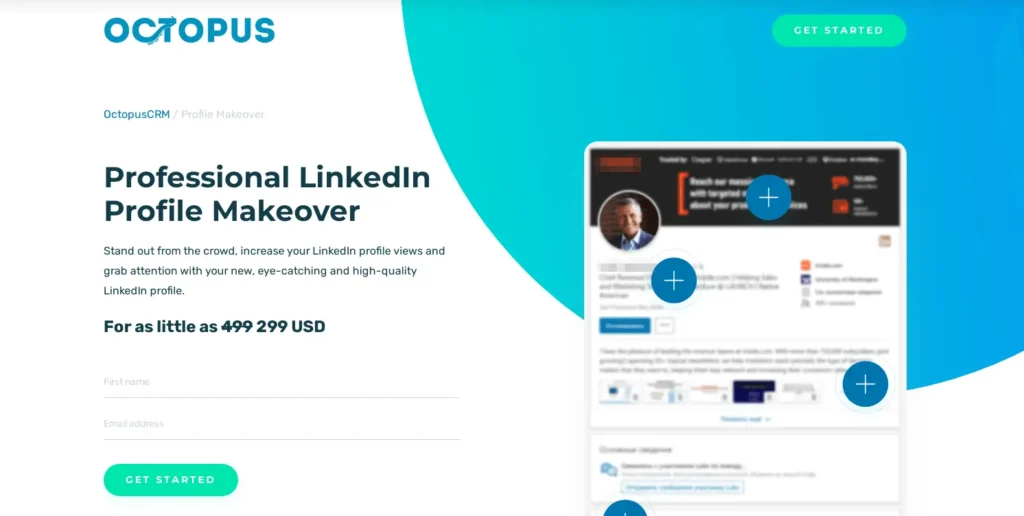
Many users feel overwhelmed when it comes to writing or optimizing their profiles with LinkedIn keywords. This is where Octopus CRM’s LinkedIn profile writing service has you covered.
Our team will give your profile an overhaul, making it look polished and more visible in relevant search results. No matter if you want to land a dream job or build professional connections, our LinkedIn profile makeover service can make the process seamless.
- Increase Your Profile Views – We’ll do keyword research specifically for your profile and then fine-tune it with the most popular and relevant terms in your industry or niche. This targeted approach will make it easy for recruiters, potential clients, and collaborators to find you;
- Build Your Reputation – With the right updates, your profile will showcase your expertise and leave a lasting impression;
- Keep Your Profile Clean and Impressive – A clean, visually appealing profile is key to grabbing attention. We’ll create a personalized background image for you so your profile appears visually stunning. Plus, every section of your LinkedIn profile will be optimized to look polished and professional;
- Boost Your LinkedIn Conversion Rate – Upgrading your profile means you’ll get more connection requests from prospects or recruiters.
Best Keywords for LinkedIn Profile
To distinguish your profile, you’ll need the best keywords for LinkedIn that are relevant to your goals, industry, skills, and qualifications.
Below is a list of keywords for LinkedIn profile optimization that can help you get started. Make sure to pick the most relevant ones from this list.
- Project Management;
- Digital Marketing;
- Data Analysis;
- Content Strategy;
- Software Development;
- Business Development;
- Leadership;
- Financial Analysis;
- Customer Success;
- Sales Enablement;
- Product Lifecycle;
- Strategic Operations;
- Account Growth;
- Risk Mitigation;
- Process Optimization.
We’ve organized below some popular keywords on the basis of factors, including industry, job, location, skills, and much more.
Industry-Specific Keywords
To add relevance and make your LinkedIn profile more searchable, you can use key terms or phrases closely tied to your industry.
For example, if you work in finance, terms like “financial analyst” or “investment banker” can help recruiters find you more easily. This way, you can rest assured that your profile aligns with industry-specific searches.
Job-Specific Keywords
Keywords specific to the role you want to target can help your profile appear in more relevant searches on LinkedIn. Consider including terms like “remote work,” “project management,” or “data analysis” if you want to target such roles.
Location-Specific Keywords
For those looking for leads or job opportunities in a specific city or region, using location-based keywords can increase their visibility to local prospects and recruiters. For instance, keywords like “New York City,” “San Francisco,” or “Plano” can optimize your profile for location-specific searches.
Skills-Related Keywords
Many people use skill-based keywords to perform searches on LinkedIn. This means you can highlight your technical or professional skills with targeted keywords to appear in those searches.
Include terms like “JavaScript,” “content marketing,” or “financial modeling” to showcase your expertise and improve your visibility for skill-related search terms.
Action-Oriented Keywords
Another excellent way to optimize your LinkedIn profile is through the use of action-oriented keywords. Dynamic, results-driven keywords emphasize your achievements and make your profile pop up in more searches.
For example, phrases like “increased revenue,” “enhanced efficiency,” or “streamlined operations” illustrate the impact you’ve had in previous roles.
Relevant Buzzwords
Action verbs and industry-relevant terms highlight your contributions and innovation. As such, it is good to add words like “innovative,” “collaborative,” or “strategic” in different sections of your profile.
Professional Organizations
Including the names of any professional organizations you’re a part of, such as “American Marketing Association” or “National Society of Professional Engineers” will add credibility and depth to your profile.
Awards and Recognition
If you have been recognized or received an award, don’t hesitate to mention them in your profile. For instance, terms like “top sales performer,” “employee of the month,” or “industry leader” can raise your search visibility.
Publications and Articles
Many LinkedIn users overlook mentioning their industry publications or contributions in their profiles. However, adding keywords related to your publications is a great way to optimize your profile.
For example, keywords like “Forbes contributor” or “Harvard Business Review article” will go a long way towards increasing your exposure on LinkedIn since they demonstrate thought leadership and expertise.
Personal Brand Keywords
Add descriptive terms like “results-driven,” “team player,” or “entrepreneurial” to reflect your work ethic and personality. These keywords convey your unique qualities and values.
Industry-Specific Certifications
Professional certifications can give you an edge in competitive industries. Highlight credentials like “Certified Public Accountant (CPA)” or “Google Analytics Certified” to underscore your qualifications and expertise.
LinkedIn Headline Keywords
Your headline is the most visible part of your profile, so you should optimize it strategically using the most important keywords. Remember, adding keywords to your LinkedIn headline instantly hints to others about what you bring to the table.
Below are some popular LinkedIn headline keywords along with some creative methods that helps you to write a good headline for LinkedIn:
Method 1: (Title) at (Company) – Helping USP (Unique Selling Proposition)
- Software Engineer at [Company Name] – Helping businesses enhance scalability and performance;
- Digital Marketing Specialist at [Company Name] – Helping brands maximize online engagement;
- Business Analyst at [Company Name] – Helping organizations make data-driven decisions;
- HR Manager at [Company Name] – Helping teams thrive through efficient talent management;
- Sales Consultant at [Company Name] – Helping companies drive consistent revenue growth.
Method 2: (Title) | (Company) | (USP)
- Content Creator | [Company Name] | Crafting compelling narratives for impactful campaigns;
- Financial Consultant | [Company Name] | Guiding clients toward sustainable financial success;
- Customer Success Manager | [Company Name] | Delivering outstanding post-sale experiences;
- Logistics Manager | [Company Name]| Optimizing supply chains for seamless delivery;
- Cybersecurity Analyst | [Company Name] | Protecting digital assets from evolving threats.
Method 3: Title + Organization + Advantages of working with you | Keywords related to the industry| Personal touch
- Marketing Director at [Company Name] | Driving lead generation through innovative strategies | Dedicated to building meaningful client relationships;
- Operations Manager at [Company Name] | Streamlining processes to save time and resources | Known for delivering under pressure;
- Freelance Graphic Designer at Self-Employed | Creating standout visual identities for businesses | Inspired by creativity and collaboration;
- Senior Recruiter at [Company Name] | Matching top talent with leading organizations | Passionate about connecting people to opportunities;
- Software Developer at [Company Name] | Building intuitive applications for modern needs | Focused on clean code and user-centric design.
Here is a LinkedIn keywords list for profile headline optimization for different industries. You can use this LinkedIn headline examples right away:
- Strategic Consultant | Driving business transformations and innovative solutions;
- Strategic Advisor | Guiding decision-makers to achieve sustainable success;
- Growth Marketer | Scaling businesses through data and creativity;
- Performance Marketer | Unlocking growth through paid and organic strategies;
- UX/UI Designer | Crafting seamless digital experiences;
- Product Designer | Merging design thinking with user-centric solutions;
- Cybersecurity Specialist | Protecting organizations from cyber threats;
- Information Security Expert | Safeguarding critical digital infrastructure;
- Talent Acquisition Specialist | Connecting top talent with impactful roles;
- HR Recruitment Expert | Optimizing hiring strategies for diverse workforces;
- Operations Manager | Driving efficiency through innovative process improvements;
- Supply Chain and Operations Expert | Delivering cost-effective logistics solutions;
- Machine Learning Engineer | Building AI-driven models for scalable solutions;
- Data Scientist | Using machine learning to solve real-world problems;
- AI Engineer | Crafting intelligent systems to shape the future;
- Social Media Marketing Specialist | Boosting brand visibility through creative campaigns;
- Paid Social Strategist | Maximizing ROI with targeted advertising;
- Certified Financial Planner | Guiding families to make smarter financial choices;
- Investment Advisor | Developing portfolios for individual and corporate clients;
- Corporate Trainer | Empowering teams through impactful learning experiences;
- Training Consultant | Delivering workshops that inspire and transform.
LinkedIn Skills & Endorsements Keywords
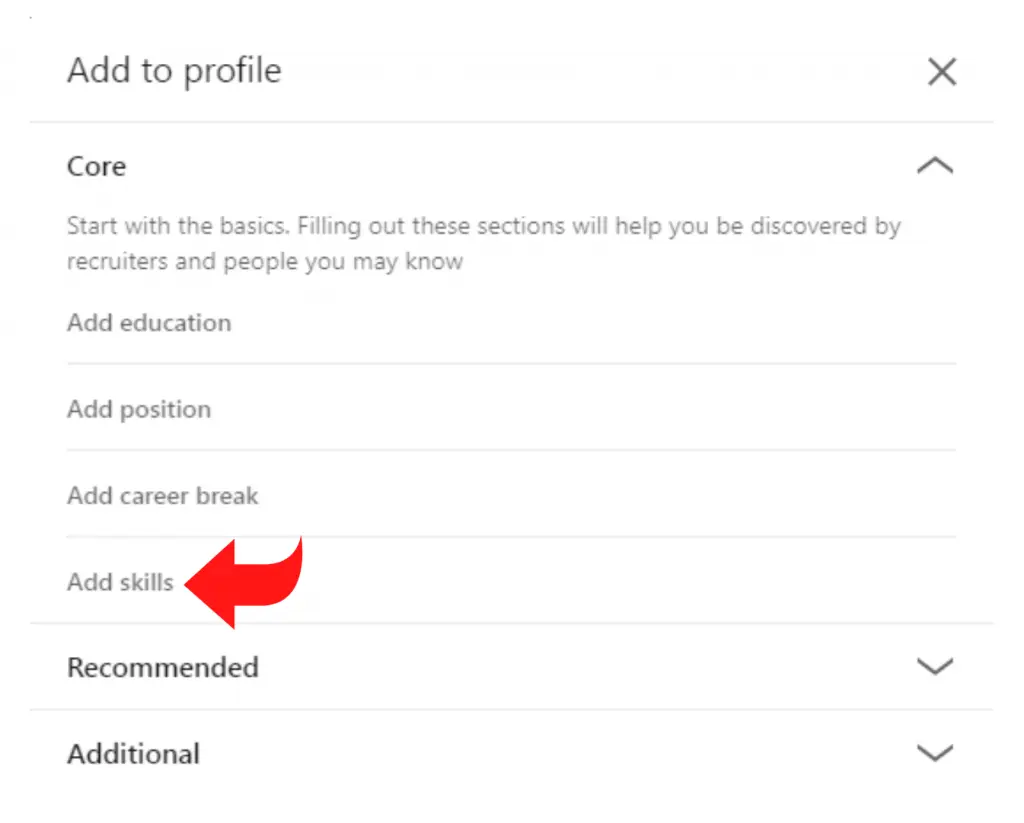
The skills and endorsements sections of your profile are excellent areas to add specific keywords and phrases that describe your abilities.
LinkedIn skills keywords can help your profile pop up when prospects or potential employers search for people with specific skills. And since most users treat skills as a search filter, adding keywords to your LinkedIn skills can increase your visibility.
Below, we’ve listed and explained the most important skills and endorsement keywords that you might want to add to your profile.
Communication & Persuasion
Good communication skills are essential for success in any role. This includes conveying ideas to clients, collaborating with coworkers, or presenting anything to stakeholders. Good communicators know how to listen as much as they speak.
Here is a communication-related keywords for LinkedIn to help improve your profile:
- Active Listening;
- Public Speaking;
- Writing and Editing;
- Conflict Resolution;
- Nonverbal Communication;
- Professional Correspondence.
Moreover, persuasion is another most important skill in the corporate sector. It involves having other people adopt your ideas, take specific actions, or make decisions. This skill is essential for building relationships and driving results.
The most important keywords related to persuasion skills include:
- Emotional Intelligence;
- Relationship Building;
- Logical Reasoning;
- Negotiation;
- Empathy;
- Storytelling.
Analytical Thinking
Analytical skills are important across many sectors, such as business, healthcare, law, and technology. They help you process complex information in order to make informed decisions. You can add one or more of the following key terms to your LinkedIn profile to become more visible to potential recruiters, collaborators, or prospects.
- Problem Solving;
- Critical Thinking;
- Data Interpretation;
- Research;
- Analytical Reasoning;
- Strategic Consulting.
Business Acumen
Business skills are essential for anyone in management or leadership positions. These skills help streamline operations, develop strategies, and improve company performance. Mentioning these competencies on your LinkedIn profile can highlight your leadership potential.
Here are some keywords related to business acumen for LinkedIn profile optimization:
- Project Management;
- Business Strategy;
- Financial Planning;
- Business Development;
- Leadership.
Technical Skills-Related Keywords
In addition to the above core skills, the following technical skill-based key terms can help your profile perform better in LinkedIn searches:
- Artificial Intelligence;
- Cloud Computing;
- Sales Strategy;
- Scientific Computing;
- Time Management;
- UX/UI Design;
- Video Production;
- Agile Methodologies;
- SEO Optimization;
- Data Visualization;
- Creative Writing;
- Financial Planning;
- E-commerce Strategies;
- Machine Learning;
- DevOps Practices;
- Event Management;
- Competitive Analysis;
- SaaS Marketing;
- Content Writing;
- Digital Marketing;
- Project Management;
- Networking and IT support;
- Cybersecurity;
- Coding/Programming;
- Data Analysis.
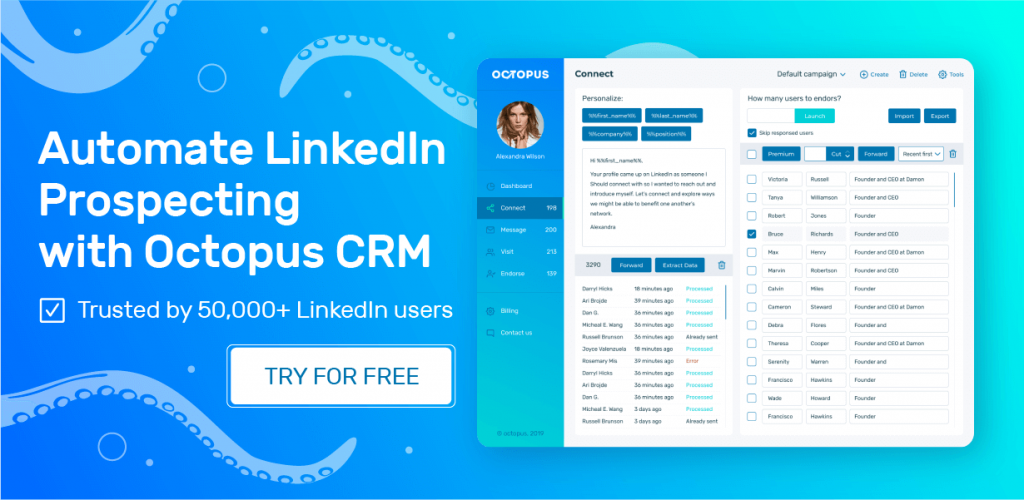
LinkedIn Summary Keywords
Your LinkedIn summary is an ideal section to include relevant keywords in your profile.
Wondering how to choose the right keywords?
One approach is to review job postings you’re interested in and highlight the key skills mentioned. You could also manually dig into the terms your prospects use to search for LinkedIn. Alternatively, you can use an online tool to automate this process.
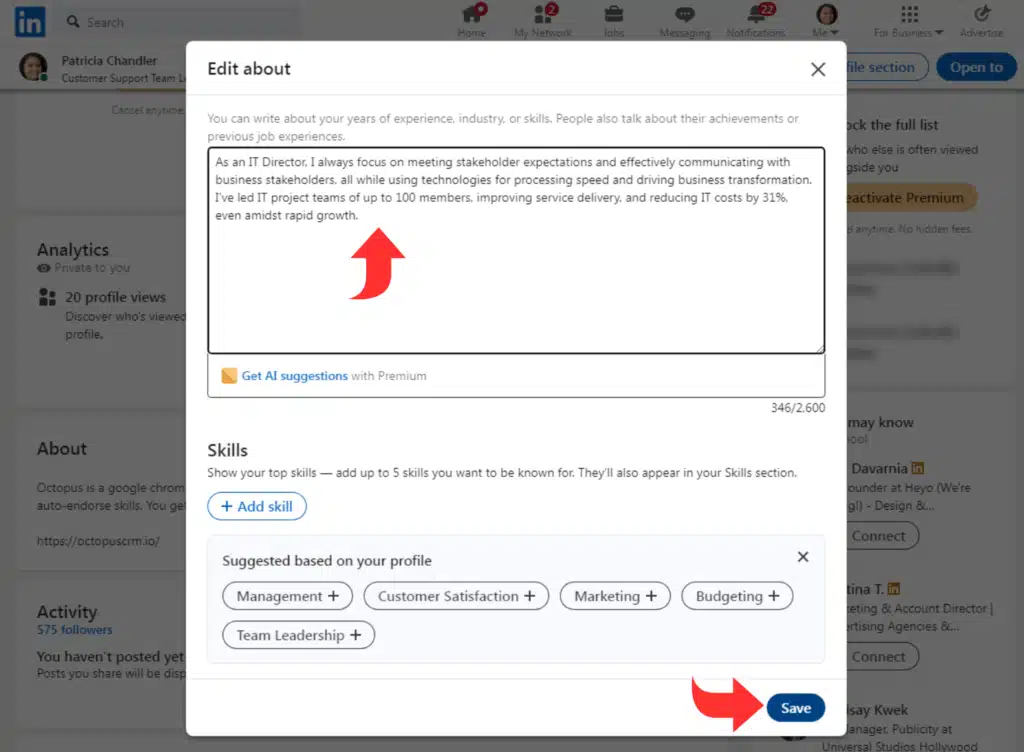
Below is an example of how to integrate keywords in your LinkedIn summary or About section:
“As an IT Director, I always focus on meeting stakeholder expectations and effectively communicating with business stakeholders, all while using technologies for processing speed and driving business transformation. I’ve led IT project teams of up to 100 members, improving service delivery, and reducing IT costs by 31%, even amidst rapid growth.”
Here are some some of the most popular LinkedIn keywords to include in your Professional Summary section:
- Collaboration;
- Analytics;
- Strategic Planning;
- Performance Metrics;
- Business Intelligence;
- CRM Tools;
- Organizational Development;
- Product Design;
- Market Analysis;
- Stakeholder Engagement;
- Brand Positioning;
- Talent Development;
- Revenue Growth;
- Project Delivery;
- Technical Expertise;
- Team Leadership;
- Operational Efficiency;
- Change Management;
- Data-Driven Decisions;
- Process Improvement;
- Client Relationship Management;
- Sales Strategy;
- Innovation;
- Cross-functional Teams;
- Risk Management;
- Customer Retention;
- Agile Methodologies;
- Digital Transformation;
- Supply Chain Optimization;
- Business Development;
- Revenue Forecasting;
- Leadership Development;
- Competitive Analysis;
- Product Development;
- Customer Satisfaction;
- Employee Engagement;
- Strategic Partnerships;
- Continuous Improvement;
- Cost Reduction;
- Enterprise Solutions;
- Customer Acquisition;
- Brand Awareness;
- Financial Analysis;
- Executive Leadership;
- Market Segmentation;
- Vendor Management;
- Market Trends;
- Operational Excellence.
LinkedIn Job Search Keywords
If you’re searching for a new job, include key terms recruiters commonly use in their search queries in your profile. You can get these keywords from the relevant job descriptions.
It is a good idea to first identify the top job postings related to your desired role. Then carefully read through the job descriptions and compile the common and important keywords into one document.
Next, incorporate these search terms into your profile as naturally as possible. This way, you can increase your chances of appearing in recruiter searches and draw the attention of those seeking candidates with your qualifications.
In doing so, it’s important to be truthful. While using these keywords can boost your visibility, overstating your abilities may result in irrelevant job offers.
Here are some popular LinkedIn keywords examples that you can tailor for your profile to improve your job search.
- Remote Work;
- Entry-Level Roles;
- Senior Executive;
- Team Collaboration;
- Cloud Infrastructure;
- Artificial Intelligence;
- Administrative Assistant;
- Customer Service;
- Receptionist;
- Part-time;
- Accounting;
- Human Resources;
- Sales;
- Manager;
- Data Entry;
- Project Manager;
- Marketing;
- Nurse;
- IT;
- Retail;
- Finance;
- Technical Writing;
- Branding Strategy;
- Market Trends;
- SaaS Solutions;
- Product Roadmap;
- Performance Evaluation;
- Innovation Strategy;
- Digital Transformation;
- Budget Management.
How to Find Keywords for LinkedIn
Finding the right terms doesn’t have to be complicated.
Below are some methods to find keywords relevant to your industry, the role you want to target, or the prospect you want to find:
- Look at job postings in your field or at company pages. Write down the keywords mentioned in the job descriptions or on the company pages (check the about, posts, and life page sections);
- Research profiles of successful professionals in your industry or niche and use their relevant keywords on your profile;
- Use LinkedIn’s search bar to see common terms in your niche;
- Analyze your own skills and experiences to identify unique keywords;
- Experiment with keyword variations to see what works best for your profile.
Top LinkedIn Keywords for Your LinkedIn Profile
Here’s a list of keywords for LinkedIn profile that work across various industries:
- Strategic Thinking;
- Product Management;
- Social Media Campaigns;
- Client Relations;
- Quality Assurance;
- Event Planning;
- Risk Management;
- Python Programming;
- Lead Generation;
- Process Improvement;
- Vendor Management;
- Budget Allocation;
- Customer Retention;
- Resource Coordination;
- Cross-Functional Leadership.
These example terms will help you understand how to choose the right keywords for your LinkedIn profile and use them to increase your search performance.
The Most Searched Keywords on LinkedIn
Knowing the most searched terms on LinkedIn can give you a good head start.
Here are the top-performing keywords on LinkedIn:
- Marketing Specialist;
- Business Analyst;
- Graphic Designer;
- Cloud Engineer;
- Human Resources;
- Product Owner;
- Financial Analyst;
- Software Engineer;
- Technical Recruiter;
- Supply Chain Manager;
- Content Creator;
- Cybersecurity Analyst;
- Data Engineer;
- Mobile Developer;
- Operations Lead.
Top 10 Keywords Recruiters Look for on LinkedIn
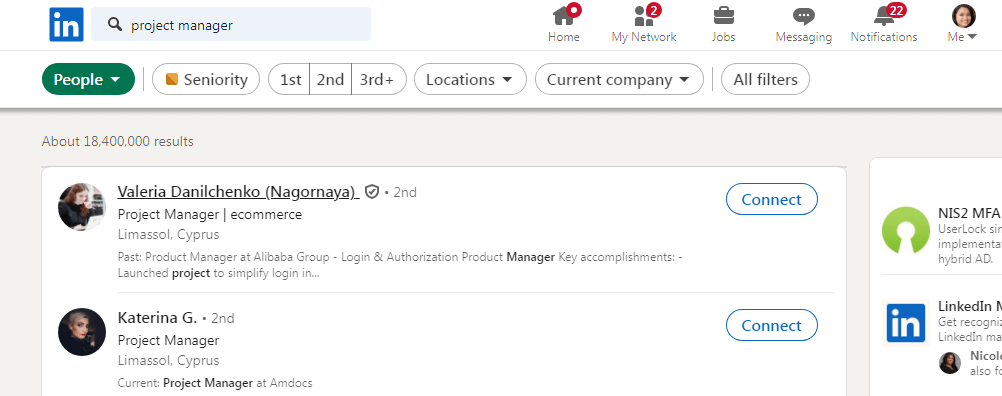
Recruiters often search for specific skills and roles. These are some of the most in-demand keywords recruiters look for on LinkedIn:
- Project Manager;
- Data Scientist;
- Full Stack Developer;
- Sales Representative;
- Operations Coordinator;
- Machine Learning Specialist;
- Account Manager;
- UI/UX Designer;
- Financial Consultant;
- Human Resources Manager.
Conclusion
Using top LinkedIn keywords is an excellent way to optimize your profile on the platform, increasing your visibility in search results. However, it is important to incorporate keywords strategically and naturally in your profile content and sections. Stuffing LinkedIn with irrelevant key terms or phrases or unnatural keyword placement can backfire instead of helping improve your profile’s performance.
Take the time to optimize your profile as thoughtfully as you can. If you’re unsure where to start, consider using Octopus CRM LinkedIn profile writing service. Remember, when you use the best keywords for LinkedIn, your profile becomes a magnet for opportunities.
